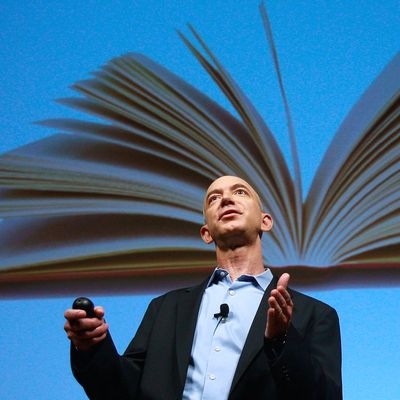
Up until this morning, Hachette CEO Michael Pietsch was the quietest publisher in New York—refusing for months to comment on details of ongoing negotiations with the world’s biggest online retailer. Then, just before lunch, he sent a letter to colleagues and another to agents and authors letting them know that his company’s lingering, increasingly bitter contract dispute with Amazon was over. Hachette’s books, which Amazon was deliberately under-stocking and overpricing for months, became freely available on the site earlier today.
Just like Simon & Schuster, which reached its own agreement with Amazon last month, Pietsch was cagey on the details. But, as with the larger publisher, Hachette announced that it will retain control over the price of its ebooks — a great, enduring sticking point with Amazon that resulted in the Justice Department’s successful price-fixing suit against the Big Six (now Big Five) publishers and Apple. Pietsch wrote today that the deal “gives us full responsibility for the consumer prices of our ebooks.”
At the same time, in a joint statement with Hachette, Kindle VP David Naggar referenced “specific financial incentives for Hachette to deliver lower prices.” Does this mean Amazon’s share of revenue (a major point of contention) changes depending on the price of the book? No one is saying. What seems clear is that Amazon’s hardline negotiating tactic of removing Hachette’s books — which created a backlash that filtered down to authors and even segments of the general public — probably won’t be tried again, at least not in quite this way. Never mind that the three remaining publishing conglomerates are also coming up against contract deadlines with Amazon — including the gargantuan, newly merged Penguin Random House.
The dispute so angered authors that more than 900 of them signed a petition on behalf of Authors United, a group led by thriller writer Douglas Preston that has been agitating against Amazon with increasing volume. They were last seen asking the Justice Department to look into Amazon’s perceived violations of antitrust law. That seemed unlikely, given that the Justice Department had recently won a lawsuit in the other direction. But what does the resolution of Amazon vs. Hachette mean for Authors United, and for a publishing community infuriated with Bezos?
Reached by email, Preston said he was on a plane, but had this to say on behalf of Authors United: “I’m relieved that Amazon and Hachette reached an agreement. I can only hope that, if disagreements arise in the future between Amazon and publishers, Amazon will never again seek to gain leverage by sanctioning books and hurting authors.”
If Preston has more to say after his plane lands, we’ll have an update.
Update: We caught up with Preston just after his flight touched down in Newark; he’d learned of the deal by dint of his in-flight wifi. “I’m very relieved,” he said. Authors United would be disbanding for the time being, he said—but only after following up with the DOJ by providing information toward an investigation of possible antitrust violations. “The central problem, which is that Amazon controls 60% of the entire retail ebook market in the United States and is willing to harm authors to get what it wants—that is a problem still to be solved. But as it is now, I think we can sit back and relax.”
Preston says he knows for a fact that his campaign helped break the stalemate between Amazon and the major publishers. “The people at Simon & Schuster are absolutely convinced that they would not have been able to settle if it weren’t for us.” Asked if his source was S&S CEO Carolyn Reidy, he hesitated. “I probably should not answer that question.” He thinks S&S struck a “reasonable deal” with Amazon and Hachette likely did as well. So Authors United is standing down. “But if Amazon thinks that they’re gonna pull this again, we will be back.”





